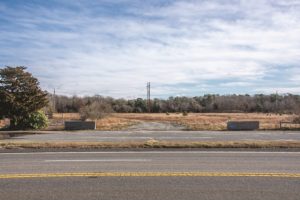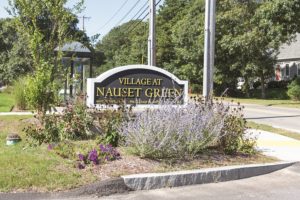EASTHAM — The T-Time Development Committee is attempting to do it all. Its final recommendations for use of the 11-acre former driving range on Route 6 include housing for those making up to 150 percent of area median income, a community center, walkable green space, affordable commercial venues, and, if the budget permits, a 50-meter swimming pool.
On Monday, the select board voted unanimously to approve the recommendations.
The next stage is a master plan, where details like building size and design and Route 6 infrastructure get worked out.
The committee’s proposal included a plan for Town Center Plaza, the 3.5-acre parcel on Route 6 that the town purchased earlier this year. That site would see additional retail and restaurant spaces while retaining its six existing commercial tenants. Top-of-shop housing would be added. Planners want the developments together to serve as Eastham’s village center, where pedestrians and cyclists can move freely, but T-Time Committee Chair Karen Strauss told the select board, “Town Center Plaza will be its own space with a different vibe from the T-Time site.”
Strauss told the Independent that the committee spent a long time trying to balance the community’s needs with its desires.

The group collected 2,200 survey responses during its initial outreach last spring. It then conducted another survey after publishing its initial recommendations in August. It hosted additional forums to collect more information from those who were underrepresented — younger residents in particular. Town Administrator Jacqui Beebe called the work “the most extensive public outreach that the town of Eastham has ever done.”
The committee decided to recommend housing at both sites, even though they understood not everyone sees it as essential. The survey did not rank order potential uses of the site but offered respondents a chance to comment in three areas — community center, housing, and business and economic development. Among those who commented on housing, 43 percent said they did not see it as important, while 39 percent said it was.
Meanwhile, the town’s 2021 Housing Production Plan had identified a massive unmet need for housing. “Sometimes you have to give people what they need,” Strauss said.
It has not been decided how much housing will end up at T-Time. Strauss noted that the committee took into account the fact that the town had rejected a proposal by Stratford Capital Group to build 130 units at the site in 2017. Looking ahead to an eventual town meeting vote, she said, “We have to get two-thirds of the town to support this project.”
The committee recommended that housing at T-Time and Town Center Plaza be designed for those earning up to 150 percent of the area median income (equaling $106,296 for an individual, based on 2019 AMI). With the Village at Nauset Green’s income limit being 90 percent of AMI, Strauss said, many people who were interested in apartments there earned too much to qualify.
That’s why, she said, the committee wanted to bump up the income limit at the town-owned sites. “If your firefighters and town employees and so on can’t afford to live in town, you really have to address that,” she said, “as well as addressing housing for people who make under 80 percent AMI.”
Carolyn McPherson, president of the Eastham Affordable Housing Trust, commended the committee’s work at Monday’s select board meeting. Cheryl Gayle, chair of the climate action committee, endorsed the T-Time Committee’s recommendation that the developments use only renewable energy.
As for the recommendations on a new community center, an indoor public recreation building is already a target of the town’s 2020-2024 strategic plan, and public support for it was high throughout the T-Time input-gathering process. What is envisioned at this stage is a building that would house the town’s recreation dept., which does not currently have a permanent headquarters.
The council on aging might also choose to move to the new space; if it does, the recommendation is that its property on Nauset Road would be used for housing. The public also asked for affordable commercial space. A 2021 market study commissioned by the town found that Eastham has unmet demand for start-up entrepreneurial spaces as a result of its very low commercial vacancy rate.
All new businesses at T-Time will have to comply with a deed restriction placed on the property by Stop & Shop. Because of that restriction, no vendors at the future village center will be permitted to sell food or food products for offsite consumption. Stop & Shop added the restriction after it bought the property from the Tedeschi family in 2013. The supermarket chain has a lengthy history of purchasing land that would be attractive to competitors and using deed restrictions to prevent other food businesses from being developed. When Eastham voters approved the $1.6 million purchase of the property in 2019, the 99-year restriction came with it.
Stop & Shop is owned by Ahold Delhaize, a Dutch multinational corporation with 232,000 employees and 2020 revenue of 74.7 billion euros.
The town is currently searching for a firm to complete the master plan by January 2023. The consultant will take the committee’s recommendations and attempt to create plans “consistent with the ‘look and feel’ of Eastham.” Residents will likely be able to vote on a comprehensive development plan for both sites at town meeting in 2023.
No Markets Need Apply
Following is the text of the Stop & Shop deed restriction in effect for the T-Time site through the rest of this century:
“Section 1. No portion of or premises on the Property shall be used, leased, occupied or licensed for a food supermarket, a food superstore, a food warehouse store, a specialty food store (e.g. a butcher shop, fish market, fruit and/or vegetable market or stand), a wholesale club store operation or a convenience store, or for the sale of food or food products for off-premises consumption (whether by humans or animals).
“Section 2. In addition, no portion of the Property shall be used for parking (including satisfaction of any of the parking requirements under local zoning codes or by-laws), utilities, infrastructure or other services for or supporting any buildings now or hereafter situated on any land abutting the Property which are used for any purpose which is prohibited under the foregoing Section 1, or for the display of any purpose which is prohibited under the foregoing Section 1.”
Editor’s note: An earlier version of this article published in print on Dec. 9 erroneously stated that the 2017 Stratford Capital proposal for the T-Time property was for 50 rental units. It was in fact for 130 units.

